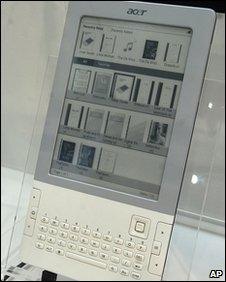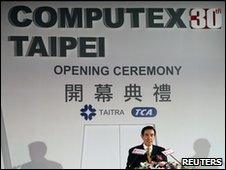Keep taking the tablets, says Acer
- Published
Ultra-mobile personal computers (UMPCs) have become a major battleground in the computing world.

Acer's e-reader is not the firm's last word in tablet devices
In 2008, it was the netbook. Last year, it was the smartphone and this year, it is the tablet.
And PC makers are desperately trying to find the winning combination of features that will set the standard for the industry.
At this year's Computex in Taipei, Asia's biggest technology show, the head of the world's second-biggest PC maker, Acer, gave the BBC a preview of its prototype tablet PC.
It is much smaller than the Apple iPad, which went on sale around the world last week. It will contain an ARM microprocessor for longer battery life and use the Android operating system.
And below the 7-inch screen is a keyboard. "We've had very good feedback about the keyboard," says Acer's chief executive Gianfranco Lanci.
"Under-35s are happy with touch screens, but 35 to 40s still prefer a keyboard."
Flashy features
But Acer's chief executive appreciates gadgets are for play as well as work.
The tablet will be more than an e-reader or virtual clipboard - it will stream video and movies and even support HDMI for high definition video.
But the main departure from the iPad and iPhone is that it will support Adobe Flash, the standard format for video and games on the internet.
"Yes, it must support Flash," says Mr Lanci. "We can't have a product that comes with restrictions.
"Yes, Flash is more complicated to programme than other alternatives and its use of battery is more critical, but most of the internet still uses it."
So when can we expect to see Acer's new tablet in the stores? "There are still a couple of bugs to work out," he says, demonstrating how the tilt function doesn't always work. "It will launch the end of Q3, maybe Q4."
All about China
Acer chose Beijing to launch its new range of computers and gadgets, rather than a European city or the Computex exhibition in its home city of Taipei.
"In a few years, China will become the world's biggest PC market," says Mr Lanci.

Even the Taiwanese president comes to Computex
During his stay, Mr Lanci also signed some important agreements with the government.
Acer is one of just a handful of foreign firms to benefit from Chinese stimulus grants to subsidise computer sales in rural provinces.
Acer has a large manufacturing base in China, but chose to outsource some production of one of its new smartphones to contract manufacturer Foxconn.
The firm has come under intense scrutiny in recent months after a spate of suicides at its Chinese factory. Workers' rights organisations alleged low wages and stressful working conditions were to blame.
Foxconn fall-out
"We are seriously concerned about the situation at Foxconn," says Mr Lanci. "We are trying to understand what needs to be changed in order to make sure people can have a good environment and we don't see this problem in the future."
Foxconn has now raised the minimum wage at its Shenzhen factory by 20%, also in response to a growing shortage of factory workers.
Other firms and provincial and city governments have done the same. These rises will raise costs for firms like Acer.
But, asked whether Acer would consider following rivals now investing in cheaper labour markets such as Vietnam or Indonesia, Mr Lanci is insistent.
"There is nothing comparable to China," he says, "if you look at important things.
"The supply chain is already well established in China. "
Euro troubles
China may be a target market, but sales in Europe, the Middle East and Africa account for half of Acer's revenue.
In recent weeks, the euro has plunged against Asian currencies, including the Taiwanese dollar.
"With the depreciation of the euro, prices are going up," says Mr Lanci. "No doubt we need to adjust our prices [in Western Europe].
"I don't think there is any possibility for escape."
Eurozone governments are also slashing spending to reduce their huge debts. Public sector pay is being frozen or cut and many people could be thrown out of work altogether.
But forecasts of a fall in European demand do not appear to worry Mr Lanci when it comes to selling computers.
"PCs are really a commodity now. The average price of a PC is now 300 to 400 dollars or euros," he says.
"In the worst case, [that] is one week's salary of the people in Europe. It's not as big an investment as it was three, four, five years ago."